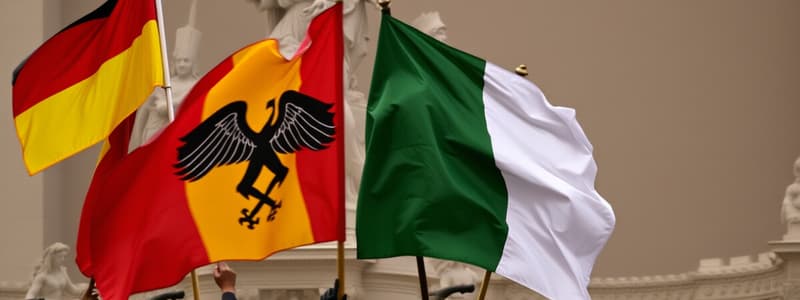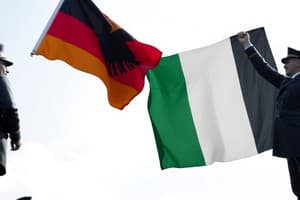Podcast
Questions and Answers
What is nationalism?
What is nationalism?
- Love of country and willingness to sacrifice for it (correct)
- Support for internationalism
- Opposition to government intervention
- Advocating for free markets
Who was Otto Von Bismarck?
Who was Otto Von Bismarck?
Chancellor of Prussia from 1862 until 1871, later Chancellor of Germany.
What was the Austro-Prussian War?
What was the Austro-Prussian War?
A war between Austria and Prussia resulting in the unification of the northern German states.
What role did the Franco-Prussian War play in German unification?
What role did the Franco-Prussian War play in German unification?
Who was Guiseppe Mazzini?
Who was Guiseppe Mazzini?
What did Guiseppe Garibaldi do?
What did Guiseppe Garibaldi do?
What is Liberalism?
What is Liberalism?
What defines socialism?
What defines socialism?
What is Romanticism?
What is Romanticism?
Define Impressionism.
Define Impressionism.
What was the Zollverein?
What was the Zollverein?
What is meant by 'Blood and Iron'?
What is meant by 'Blood and Iron'?
Define Kulturkampf.
Define Kulturkampf.
Who was Wilhelm I?
Who was Wilhelm I?
Who was Wilhelm II?
Who was Wilhelm II?
What does the term Kaiser refer to?
What does the term Kaiser refer to?
Flashcards are hidden until you start studying
Study Notes
Nationalism and Unification Concepts
- Nationalism: A strong love for one's country, often motivating individuals to make sacrifices for its interests.
- Liberalism: Promotes free market competition and a self-regulating economy; rooted in individual freedoms.
- Socialism: Advocates for collective ownership and control of production and distribution resources.
Key Figures in German Unification
- Otto Von Bismarck: Chancellor of Prussia and later Germany; key in orchestrating victories over Austria and France to unify German states.
- Wilhelm I: King of Prussia who became the first Kaiser of unified Germany; appointed Bismarck as Prime Minister.
- Wilhelm II: Ruler during WWI, known for his aggressive policies and desire to showcase Germany's power.
Major Wars Leading to Unification
- Austro-Prussian War: Conflict that expelled Austria from German affairs and helped unify northern German states under Prussian leadership.
- Franco-Prussian War: Conflict where Bismarck unified German states against a common enemy, resulting in German victory and annexation of Alsace-Lorraine.
Key Figures in Italian Unification
- Guiseppe Mazzini: Established a nationalist group in 1832; aimed for social justice and democracy, played a pivotal role in unifying Italy.
- Guiseppe Garibaldi: Leader of nationalist forces in southern Italy; known for his "Red Shirts" and ensuring southern unity with the north.
- Camillo di Cavour: Prime strategist behind Sardinia's unification efforts; instrumental in establishing a Northern Italian state.
- Victor Emmanuel II: King of Sardinia who became the first king of a united Italy in 1861; made Rome the capital later.
Cultural Movements
- Romanticism: Artistic and literary movement emphasizing nature and emotion over civilization.
- Realism: Philosophical belief that abstract concepts exist independently of their names; focused on representing everyday life.
- Impressionism: Artistic style capturing fleeting moments and feelings, primarily focusing on modern life.
Economic and Political Structures
- Zollverein: A customs union in Germany promoting economic cooperation and helping foster German nationalism.
- Blood and Iron: Bismarck's policy suggesting that unification would be achieved through military strength and industrial power.
- Kulturkampf: Bismarck's campaign to subordinate church allegiance to state loyalty.
Organizations and Entities
- North German Confederation: Established post-Austro-Prussian War; excluded Austria from German affairs and unified northern states under Prussia.
- Kaiser: Title meaning "German Emperor."
Important Concepts
- Laissez-faire: Economic principle advocating minimal governmental involvement in the economy.
- Hohenzollern: A prominent family dynasty from Brandenburg-Prussia linked to the establishment of the German Empire.
Studying That Suits You
Use AI to generate personalized quizzes and flashcards to suit your learning preferences.




